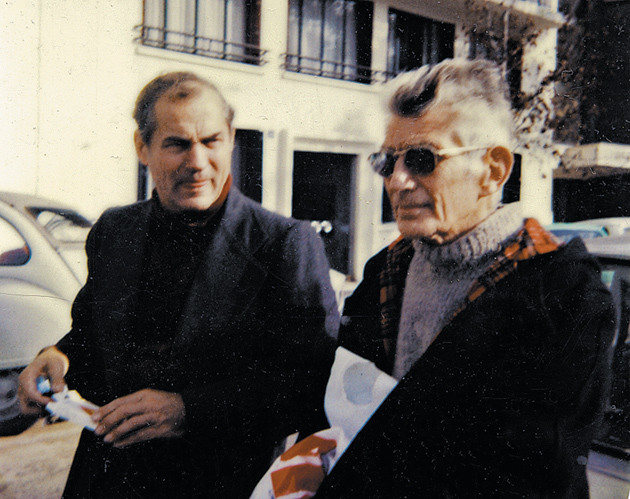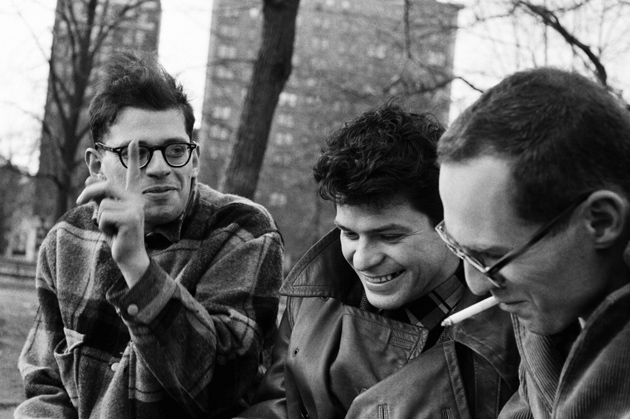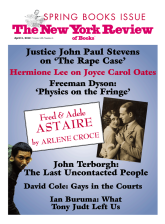No child daydreams about becoming an editor. A writer, perhaps. An inspiration, maybe, in the sense of a muse. How do people become editors?
Richard Seaver suggests that editors are people who admire writers. He grew up near Wilkes-Barre, Pennsylvania, and at the University of North Carolina wrote a thesis on Hemingway. It was called “Ernest Hemingway: The Good Inner Feeling,” taken from Hemingway’s remark that “what is moral is what you feel good after.” In 1948, on his way over to Europe after graduating, he got a chance to show his essay to Hemingway’s son Patrick, who pronounced it a damn good job and gave Seaver his father’s address in Cuba, which he was too modest to use. Other writers Seaver admired were James Joyce, Eugène Ionesco, and Samuel Beckett. He wrote his dissertation at the Sorbonne on Joyce and could recite from memory parts of Finnegans Wake in Joyce’s accent. He told other expatriate editors in Paris that there were two good writers working in French, both foreigners: the Romanian Ionesco and the Irishman Beckett. Joyce had already been discovered and published by an older generation, but Beckett was still unknown.
Before the war Beckett had written in English and even had a novel, Murphy, published in English by Routledge in London in 1938. But after the war for a variety of reasons he began to write in French. His great trilogy Molloy, Malone Dies, and The Unnamable, his best work, was written in French as well as his play Waiting for Godot and the plays that followed. There are various theories why Beckett, who earlier wrote a book on Proust in English, switched languages for plays and fiction. During the war years, when he’d been a résistant in the south of France living with a French girlfriend, he’d spoken French almost exclusively, including during his job as a farmhand. He also found that writing in French, because it was more difficult, cut down on the excessive wordplay that had characterized his early work and that of his idol, James Joyce. In English, he wrote, “you couldn’t help writing poetry in it.” He said that whereas Joyce’s work was achieved through addition and perfection, his own work proceeded through elimination. As he said shortly before his death:
I realized that Joyce had gone as far as one could in the direction of knowing more, [being] in control of one’s material. He was always adding to it; you only have to look at his proofs to see that. I realized that my own way was in impoverishment, in lack of knowledge and in taking away, in subtracting rather than in adding.
In addition, the French novels, unlike the English ones, were written in the first person, and in French there is a long tradition of such récits, culminating in Camus’s The Stranger. Whereas Beckett’s English-language novels, Murphy and Watt, are recognizably set in Dublin or London, the French trilogy is in a timeless, uncharacterized void—which is more universal. Descriptive scene-painting is part of the genius of English; French eschews that sort of specificity. “It was more exciting for me—writing in French,” Beckett once said.
Beckett was Seaver’s biggest catch and he was aware of it, though later he also published such stars as Ionesco, Arthur Adamov, William Burroughs, Alexander Trocchi, and Henry Miller, as well as the books Games People Play and The Story of O. He “discovered” Beckett in the window of a French publisher, Éditions de Minuit, devoured the French books, and then virtually forced himself on the young, reclusive editor Jérôme Lindon, who had started publishing underground during the occupation and had quietly become the head of avant-garde publishing. The two men took to each other instantly, particularly since they shared a devotion to Beckett. Lindon promised to convey Seaver’s letter to Beckett asking if he could publish something by him in Merlin, an English-language magazine he was helping to edit. It was an heir to the earlier transition and preceded by a year The Paris Review.
From the beginning Seaver championed Beckett in the magazine. Trocchi, his fellow editor, suggested that Seaver write an essay about Beckett, an introduction, which he did, though the assignment overawed him. When the Merlin team had given up on ever hearing from Beckett, the author himself showed up at their door on a rainy night with the manuscript of Watt in hand and a suggestion for a difficult but very funny excerpt. The editorial team decided to open the third issue of the magazine with this excerpt, even though they knew that many readers would toss it away with disgust or incomprehension.
Advertisement
Now that they had Beckett’s confidence, the “Merlin lads” (as Beckett called them), decided to publish “The End,” a story first published in Sartre’s magazine Les Temps modernes. Or rather half-published, since an agent for Beckett had given Sartre only half the story for fear of scaring him off. When Beckett insisted that Sartre publish the second half he refused, accusing Beckett of having played a nasty trick on him in order to dominate his pages. Beckett was furious, as he was at Merlin, which published Watt in English as a book full of typos and with an “awful magenta cover.” Beckett found eighty spelling and typographical mistakes and an entire sentence that had been dropped. He was also angry at the “Merlin lads” for not paying him royalties.
Although Seaver in his book pretends that everything was going well between Merlin and Beckett, in fact Beckett wrote Trocchi an angry letter denouncing their publication of “The End,” a story that he and Seaver had translated from the French and that, as Beckett wrote a friend, “for want of proof correction, is full of ridiculous mistakes. Have written a stinker to Trocchi. Fed up with them.” But Beckett wasn’t so irritated that he didn’t continue to publish all his life with Seaver, after he moved to New York and got a job with Grove Press.
Seaver, from the photos, was very handsome as a young man and had lots of adventures with women. A few of them make their way into this memoir, although heterosexual men can seldom be completely honest about such things for fear of what their wives will think. There are a few exceptions (Casanova, Frank Harris, Henry Miller) and each time one of them writes honestly it makes headlines. Seaver is decorous in telling us about his affair with Jeanne Theis, the eldest daughter of a Protestant pastor and the head of the Collège Cévanol on the Cévennes plateau. She gave him a list of essential French writers to read, including Gide, Camus, Cocteau, and Bernanos, which he dutifully ticked off and which led him to other contemporary favorites. She also went with him on a strenuous bike ride to Italy.
In 1950, Seaver traveled to Vienna, where he came under the spell of a woman named Patsy who worked at the American embassy. She introduced him to many of her late-night singing buddies, some of them Russian soldiers, and Seaver was able to interview them about how the joint Allied occupation of Vienna was working out (not well), which provided him with something of a scoop as a journalist.
Back in Paris he befriended the painter Jack Youngerman and in his little Paris hotel room he hung a Youngerman and an Ellsworth Kelly (a new friend). He played host to the alcoholic Irish playwright Brendan Behan. More importantly he began to court a teenage violinist, Jeannette Medina, whom eventually he married.
If the first part of his memoir is about Paris in the Fifties and the adventure of publishing Beckett among others, the second part is about Grove Press in New York, where he became one of the early editors of an enterprise financed and led by Barney Rosset. It’s a story of Grove’s long battles with censorship, with which Seaver was closely involved. Rosset, who died on February 27, was intrepid cases in fighting cases through the courts with Seaver’s help. One of the first was D.H. Lawrence’s Lady Chatterley’s Lover. It was covered with accolades from critics but it contained explicit sex scenes and four-letter words. Its high status among critics made it a good test case and at its trial for obscenity Malcolm Cowley and Alfred Kazin both testified on its behalf. Eventually Grove won the case in a landmark decision and the book went on the best-seller list.
The next “difficult” author was Alexander Trocchi, the Scottish novelist from Paris and Merlin days who over the years had become completely hooked on heroin, in fact an advocate of its effects. He had an easy job as captain of a scow in New York, which was compatible with his habit. He was struggling, in spite of the demands of heroin, to complete the autobiographical Cain’s Book. Seaver describes the tense moment when they met in New York after years apart:
When he entered my office…he looked exactly the same: imperiously tall, his smile as seductive as ever. Only the eyes seemed different, more sunken, and where they had always been in repose, self-assured, now they darted nervously about from time to time, as if checking the terrain to make sure it was safe. In his hand he was bearing a manila envelope, wrinkled and slightly stained. Thin. I had been hoping for a full manuscript, but this was clearly only a fragment. Suddenly I wondered if Barney wasn’t right: he’d probably never finish it….
Seaver and Rosset were in fact so afraid that Trocchi would never deliver that they paid him small sums in cash every time he came by the office with finished pages. George Plimpton, the editor of The Paris Review, was also doling out small sums. The method, though questionable morally, worked and the completed book was one of the best Grove published, an eloquent realist account of drug addiction to offset Burroughs’s Surrealist version.
Advertisement
The next censorship problem was encountered with Henry Miller’s Tropic of Cancer, about which Rosset had written an essay and which was banned in almost every country in the world. Miller himself, who was living a peaceful life in Big Sur, was reluctant to stir up trouble with his neighbors in California. Maurice Girodias, a slippery character in Paris who headed the Olympia Press, cooperated in defending the book though every time Grove won a censorship battle it cut into his profits, since he brought out not only porn—some by talented writers such as Alfred Chester—but also quality literature banned elsewhere in the green volumes of his traveler’s series (Lolita, Moll Flanders, D.H. Lawrence, Henry Miller). “Olympia’s success,” Seaver writes,
rested squarely on the still-Victorian attitudes toward sex both in England and in America. As long as anti-obscenity laws prevailed in the English-speaking world, Olympia’s increasing output and growing backlist—which in a number of cases [was] reprinted every few weeks—had a virtual monopoly.
Finally in July 1962 a Massachusetts appellate court voted 4–3 that Tropic of Cancer was not obscene. But the decision didn’t ensure the fortunes of Grove, since in community after community in America there were obscenity trials against the book and Grove was committed to defending its author in each place. Its large lawyer’s bill was potentially augmented when it published Burroughs’s Naked Lunch. There was an expensive court battle but again the highest court in Massachusetts found in the book’s favor, shortly after the US Supreme Court had ruled in favor of Tropic of Cancer.
At about this time Grove founded the prestigious international Formentor Prize in conjunction with Weidenfeld in England, Gallimard in France, Rowohlt in Germany, Einaudi in Italy, and Seix Barral in Spain. Whereas Knopf or Farrar, Straus might have been more normal choices as the American affiliate, it was a tribute to Grove’s list and courage in publishing it (and to friendships cultivated during the annual Frankfurt book fair) that Grove had been chosen. The first prize, which was named after a resort island in Spain where the idea was first hatched, was split between Beckett and Borges, which symbolized the split among the prize-givers from Northern Europe and the Latin world.
John Rechy’s City of Night was in 1963 the next controversial title that Grove brought out. The book was attacked in The New York Review of Books and The New Republic, but these negative reviews only seemed to add to its notoriety and soon it was on the best-seller list.
In the Sixties Grove also became a film distributor, starting with Beckett’s script for Film, starring Buster Keaton. When there were snags in the filming, Beckett saved the day by suggesting they simply cut the troublesome scene. Again and again Seaver’s memoir testifies to Beckett’s patience in dealing with collaborators, even if he held them to the highest standards. The biggest moneymaking film for Grove was I Am Curious (Yellow), a Swedish soft-core porn blockbuster. Grove also started to publish modern film classics, scripts such as Alain Robbe-Grillet’s Last Year at Marienbad and François Truffaut’s The 400 Blows, and plays such as those of Friedrich Dürrenmatt, John Mortimer, John Arden, and Arnold Weinstein.
Jean Genet was one of the house stars and Grove was the first publisher in America to bring out his five novels and the plays. The most amusing pages in Seaver’s book tell how Seaver accompanied Genet to the stormy Democratic Convention of 1968 in Chicago. Esquire magazine had commissioned Terry Southern, Jean Genet, and William Burroughs to “cover” the convention, which they knew would be controversial, owing to mounting protests against the war in Vietnam and the beginnings of the Black Power movement. Genet sneaked into America over the Canadian border, since he’d been denied a visa because of his criminal record and leftist sympathies. Seaver and Jeannette gave Genet a tour of 42nd Street sleazy spots. Genet denounced them, saying, “These places are so dismal. Sex should not be dreary, it should be fun.” In Chicago the openly gay Genet announced that he was going to write about the convention from between the legs of a sturdy, sexy Chicago cop. Allen Ginsberg, a huge admirer of Genet, was in Chicago as well and prostrated himself before the Master (the sort of demonstration that irritated and embarrassed Genet).
I remember from my own interview of Ginsberg for my biography of Genet that Ginsberg tried to have sex with Genet but when neither of them came up with an erection, Genet (ever the realist) called the whole thing off and didn’t want to “cuddle” as Ginsberg suggested. Genet did in fact write for Esquire:
The thighs are very beautiful beneath the blue cloth, thick and muscular. It all must be hard. This policeman is also a boxer, a wrestler. His legs are long, and perhaps, as you approach his member, you would find a nest of long, tight, curly hair.
Seaver noticed how the cops, even though they had no idea who Genet was, treated him throughout with a certain respect, impressed by what he called this “Genet-inspired force.”
I’m not sure how much readers will be drawn to these tales of publishing prowess and tribulations, especially since Seaver did not live to see his book into print and his recollections can seem dimmed by time and distance, without many of the immediate details that would bring his portraits to life (what the French call petits faits vrais). Nevertheless Seaver was what every writer would want his editor to be: urbane, loyal, sensitive to aesthetic values, and fierce in his defense of freedom of speech. His honest, companionable book, edited by his widow and longtime publishing collaborator Jeanette, is an eloquent testament to a life that was cool and bold when it counted.
This Issue
April 5, 2012
They’re the Top
We’re So Exceptional
Who Is Peter Pan?





